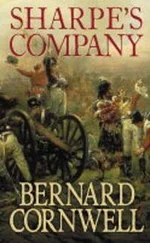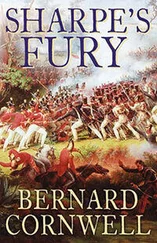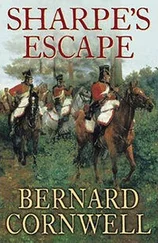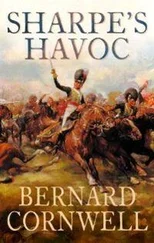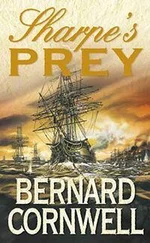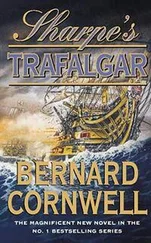Sharpe hurried back to the inn and paid his bill. He strapped the saddlebags on to his new horse, paid the ostler, and swung himself into the saddle. He wore a coat of brown homespun over black breeches, but at his side there hung a long trooper’s sword and on his back there hung a rifle. He touched the spurs on his new plain boots to the animal’s flanks. The packet boat was clearing the harbour, but Sharpe did not turn back to watch. He rode away from the sea, away from England, going into the enemy’s country to where a woman watched an empty road. It was there, Sharpe decided, that his future lay; not in Dorset, not in a peacetime army, but with work on a Norman farm and perhaps, one day, there would be a French-speaking son to whom he and Lucille would bequeath an old English sword and a ruby stolen from an Emperor.
He clicked his tongue and urged the horse into a trot. He felt dazed. There was no more war, no more soldiers, no more fear. No more Emperor, no more Harper, no more gunsmoke skeined above a field of blood. No more closing of ranks, no more miles of pain, no more skirmish chain. No more cavalry in the dawn and no more picquets in the dusk. There was only Lucille and what Sharpe thought was a love sufficient for both their lives. He rode on into France, his back turned on all he had fought for, for now it was all gone; the wars, a marriage, a friendship, and an enemy; all gone in Sharpe’s revenge.
Napoleon’s baggage was lost, though not in Bordeaux. The loss of that baggage was just a small part of the chaos that engulfed France after the Emperor’s surrender. The battle of Toulouse was fought after that surrender, but such was the speed of travel that the news did not reach Wellington till two days after he had trounced Soult.
The battle happened much as described in the novel. Today it is chiefly remembered for the tragic Spanish assault which, launched early and unsupported, was bloodily repulsed. The battlefield is now entirely built over, just an anonymous part of the city’s sprawl.
In northern and southern France the Imperial armies were disbanded, ejecting on to the roads of Europe a startling number of vagabonds and highwaymen. The era of the soldiers, it seemed, was over, for the long, long war was finished. Wellington’s army, perhaps the best that Britain has ever possessed, had won the Peninsular Campaign and now, in the spring of 1814, that army was no longer wanted. Its men were dispersed about the globe, while its women, who had so loyally supported their men, were callously sent home to Spain or Portugal. The fate of those abandoned women is accurately recorded here. They disappear from the history books, and their anguish can only be surmised. A few British soldiers did successfully evade the provosts to go back to Spain with their wives, but they were very few.
Wellington, before going to the Congress of Vienna, was appointed Britain’s ambassador in Paris where, on behalf of the government, he bought the house of Napoleon’s sister, Pauline. It remains the British Embassy to this day. Many other British officers resigned their commissions. Doubtless, like Sharpe, they believed they could hang up their swords, and none, surely, could have foreseen that Napoleon’s restless ambition would soon lead to a shallow valley on the road to Brussels; a valley where Wellington would sorely miss his Peninsular veterans. But Waterloo is another story.

